Leeds are back in the top flight after more than a decade and a half away and the consensus seems to be that they are here to stay. Both the mainstream bookmakers and the spread betting markets have them in line for a mid-table finish, and they’ve certainly spent like a team determined to reestablish themselves as a genuine Premier League outfit. James has already written an excellent piece on the club’s promotion campaign, so we won’t go into too much detail about that here, but here are the salient points. Leeds had the best metrics in the Championship for two seasons in a row. After failing to convert that into promotion in 2018-19 due to a bad run of results down the final stretch, they did so in 2019-20, going up as champions. 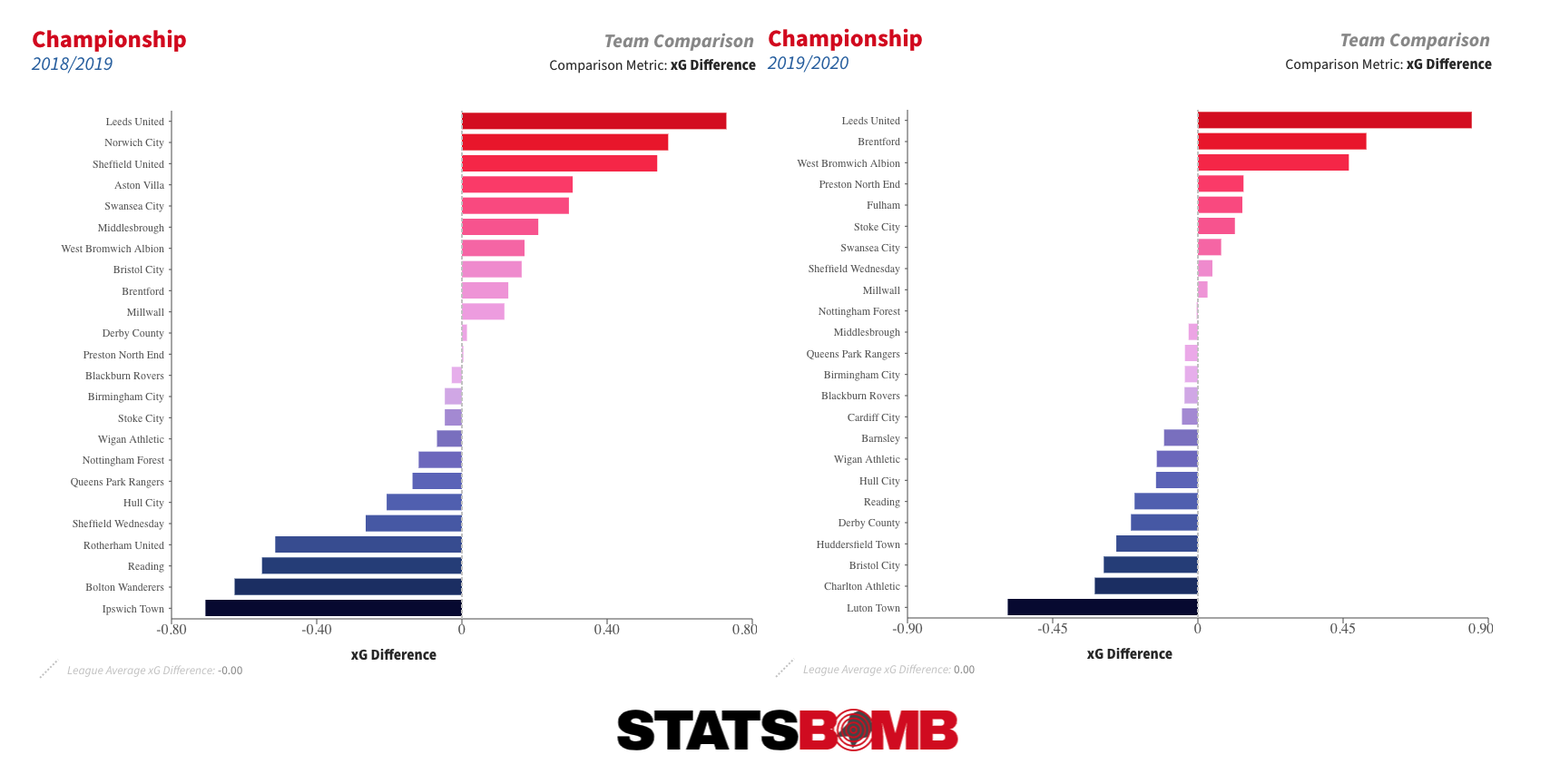 The club’s defensive record was particularly strong. They conceded just 35 times in 46 matches and also had the league’s best metrics. They gave up fewer shots (8.78 per match) than any other side, and the average quality of those shots was also one of the lowest in the division.
The club’s defensive record was particularly strong. They conceded just 35 times in 46 matches and also had the league’s best metrics. They gave up fewer shots (8.78 per match) than any other side, and the average quality of those shots was also one of the lowest in the division. 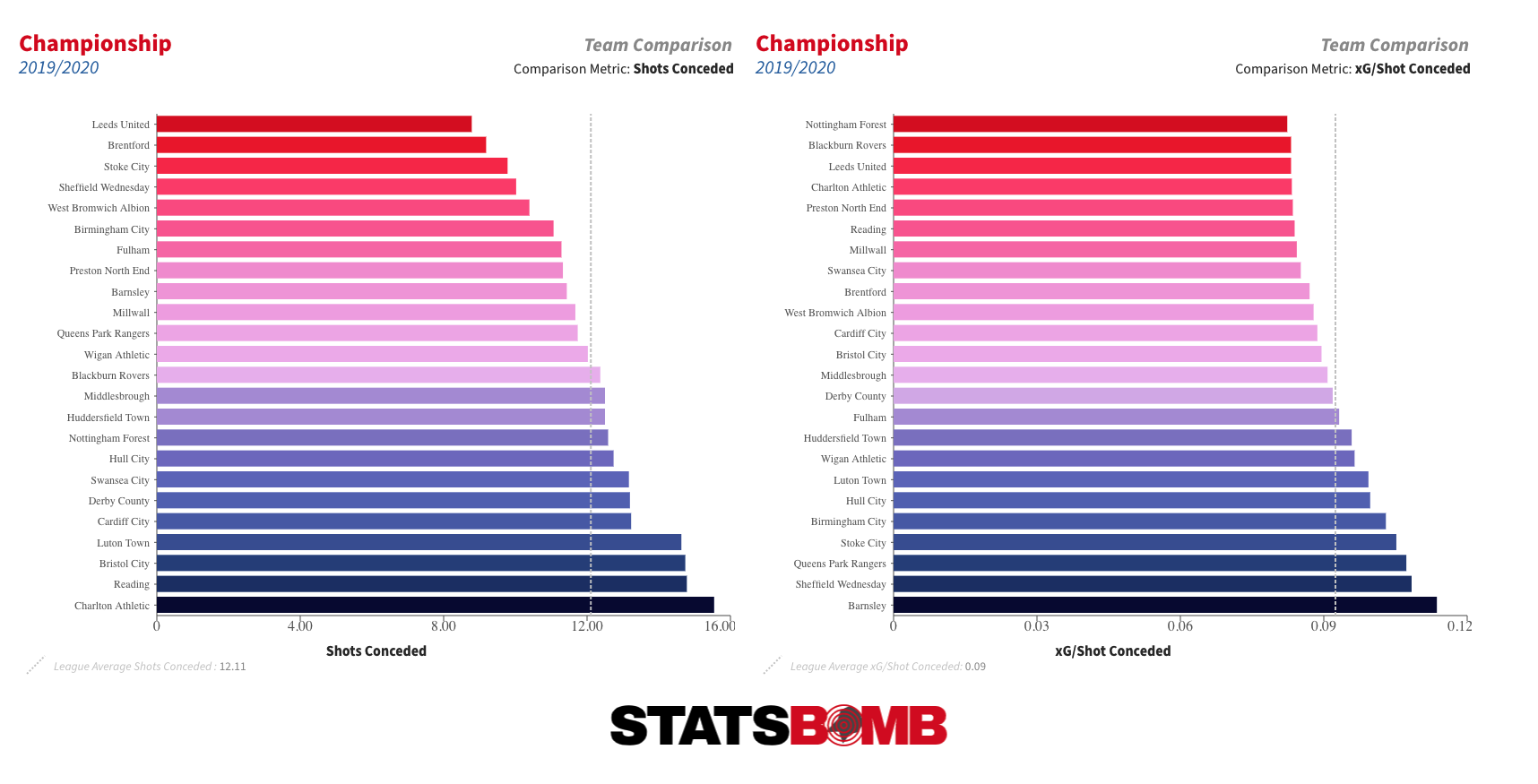 That was partly down to the efficiency of Marcelo Bielsa’s patented all-pitch press. Leeds were relentless in harrying opponents over the length and breadth of the field.
That was partly down to the efficiency of Marcelo Bielsa’s patented all-pitch press. Leeds were relentless in harrying opponents over the length and breadth of the field. 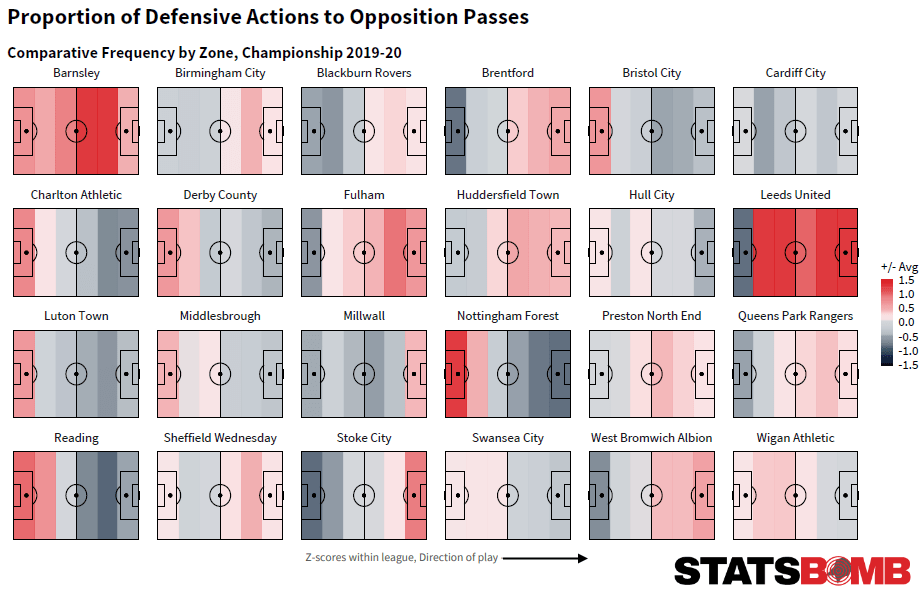 In attack, they comfortably outshot everyone, and did so while still maintaining one of the highest average shot quality marks in the league. All that off-ball movement, the pretty patterns and interchanges, helped to create a high volume of shots from good locations.
In attack, they comfortably outshot everyone, and did so while still maintaining one of the highest average shot quality marks in the league. All that off-ball movement, the pretty patterns and interchanges, helped to create a high volume of shots from good locations. 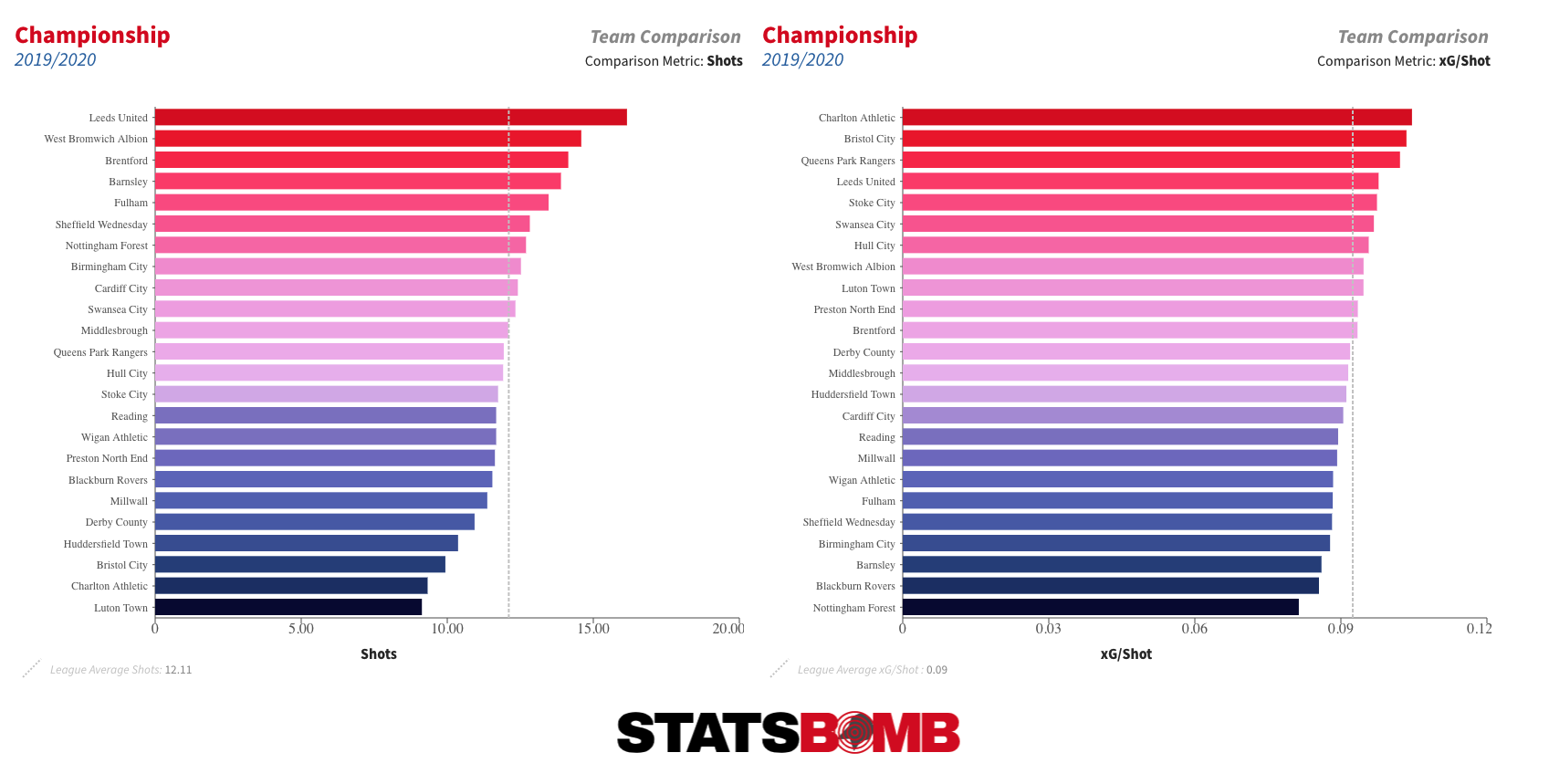 Whichever way you look at it, Leeds were a dominant team, taking 65% of the shots, accumulating 68% of the xG and scoring 69% of the goals in their matches. A clearly defined play style, strong overall metrics and a solid defensive base are all generally predictive of a good first campaign in the top flight. To illustrate this point, over the last 10 years, only two teams have been promoted with a better average goal difference per match than Leeds’ figure of 0.91: Newcastle in 2016-17 and Wolverhampton Wanderers in 2017-18. Like Leeds, both conceded under a goal per match during their promotion campaigns. Both went on to only concede around 17% more goals in the Premier League, compared to an average for promoted teams of around 40%, and both finished in the top 10. Leeds have a good base to work from, and they've also been able to retain almost all of the important squad members from their promotion campaign. Hélder Costa and young goalkeeper Illan Meslier, who got a run of games as first choice after lockdown due to Kiko Casilla’s suspension for racist language, have both had their loans turned into permanent deals. Jack Harrison will stay on board for another season on loan from Manchester City. The one key departure is that of Brighton loanee Ben White. He started all 46 matches last season, and became a key figure in the centre of defence, impressing on both sides of the ball. Reports suggest that Leeds were keen to sign him permanently, but Brighton instead decided to bring him back into the fold there. It was, therefore, unsurprising that one of the club’s first off-season signings was Robin Koch, a 24-year-old central defender from Freiburg in the Bundesliga, capped three times by Germany. White was the more proactive defender in his regular partnership with Liam Cooper, stepping forward more often to contest possession and intercept, both on a outright basis and proportionally to all defensive actions when they started together in the centre of defence. Cooper cleaned up behind and was a dominant aerial force. Koch seems to profile more like Cooper than White, with a lesser proportion of proactive defensive actions than the man he replaces. But it is important to add some context here. Freiburg were one of the most passive and deep-defending teams in the Bundesliga last season, and Koch often played as the central of three central defenders. In such a system, it is entirely normal for the player in that role to be the least proactive of the three. As such, it is hard to get a handle on just how apt a White replacement he is from the data. Their passing profiles are more similar, and Koch does seem to have solid range there. Qualitative scouting has presumably left the recruitment team confident that he can slot into White’s role. Cooper was again the less proactive element in his partnership with Pontus Jansson in 2018-19, so there is little evidence he’d be capable of defending in a different manner. As well as Koch, Leeds have also signed a trio of younger players in Charlie Allen (16), Cody Drameh (18) and Joe Gelhardt (18), the latter of whom posted good shot volume in a very limited sample size of just over 500 minutes at Wigan in the Championship last season. But the big money has been spent on the club-record, £27 million signing of Rodrigo from Valencia. Readers with good memories may recall Rodrigo from his one-season loan at Bolton Wanderers back in 2010-11, but the player who arrives at Elland Road has developed considerably since then and is now a full Spain international. He, like the entire Valencia team, didn’t have a great time of it last season, but in 2018-19, he provided a goal or assist for every 180 minutes he was on the pitch in terms of both real and expected output.
Whichever way you look at it, Leeds were a dominant team, taking 65% of the shots, accumulating 68% of the xG and scoring 69% of the goals in their matches. A clearly defined play style, strong overall metrics and a solid defensive base are all generally predictive of a good first campaign in the top flight. To illustrate this point, over the last 10 years, only two teams have been promoted with a better average goal difference per match than Leeds’ figure of 0.91: Newcastle in 2016-17 and Wolverhampton Wanderers in 2017-18. Like Leeds, both conceded under a goal per match during their promotion campaigns. Both went on to only concede around 17% more goals in the Premier League, compared to an average for promoted teams of around 40%, and both finished in the top 10. Leeds have a good base to work from, and they've also been able to retain almost all of the important squad members from their promotion campaign. Hélder Costa and young goalkeeper Illan Meslier, who got a run of games as first choice after lockdown due to Kiko Casilla’s suspension for racist language, have both had their loans turned into permanent deals. Jack Harrison will stay on board for another season on loan from Manchester City. The one key departure is that of Brighton loanee Ben White. He started all 46 matches last season, and became a key figure in the centre of defence, impressing on both sides of the ball. Reports suggest that Leeds were keen to sign him permanently, but Brighton instead decided to bring him back into the fold there. It was, therefore, unsurprising that one of the club’s first off-season signings was Robin Koch, a 24-year-old central defender from Freiburg in the Bundesliga, capped three times by Germany. White was the more proactive defender in his regular partnership with Liam Cooper, stepping forward more often to contest possession and intercept, both on a outright basis and proportionally to all defensive actions when they started together in the centre of defence. Cooper cleaned up behind and was a dominant aerial force. Koch seems to profile more like Cooper than White, with a lesser proportion of proactive defensive actions than the man he replaces. But it is important to add some context here. Freiburg were one of the most passive and deep-defending teams in the Bundesliga last season, and Koch often played as the central of three central defenders. In such a system, it is entirely normal for the player in that role to be the least proactive of the three. As such, it is hard to get a handle on just how apt a White replacement he is from the data. Their passing profiles are more similar, and Koch does seem to have solid range there. Qualitative scouting has presumably left the recruitment team confident that he can slot into White’s role. Cooper was again the less proactive element in his partnership with Pontus Jansson in 2018-19, so there is little evidence he’d be capable of defending in a different manner. As well as Koch, Leeds have also signed a trio of younger players in Charlie Allen (16), Cody Drameh (18) and Joe Gelhardt (18), the latter of whom posted good shot volume in a very limited sample size of just over 500 minutes at Wigan in the Championship last season. But the big money has been spent on the club-record, £27 million signing of Rodrigo from Valencia. Readers with good memories may recall Rodrigo from his one-season loan at Bolton Wanderers back in 2010-11, but the player who arrives at Elland Road has developed considerably since then and is now a full Spain international. He, like the entire Valencia team, didn’t have a great time of it last season, but in 2018-19, he provided a goal or assist for every 180 minutes he was on the pitch in terms of both real and expected output. 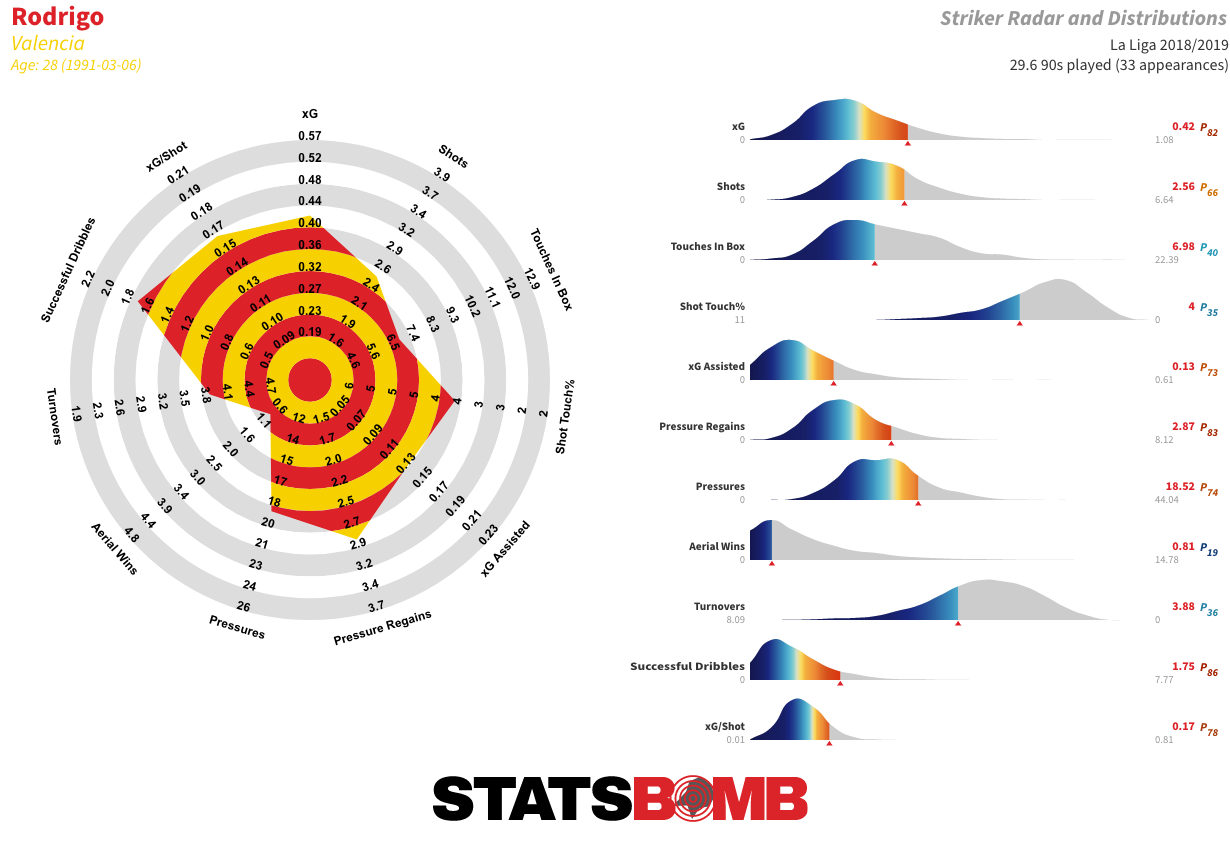 Valencia were a counter-attacking team and Rodrigo was often a key part of their forward transitions, dropping off the front to receive, turn and combine with onward runners. Quick and intelligent in his movements, he has a skillset that should mesh well with Bielsa’s system, even if, as with Koch, he comes in from a team considerably less aggressive out of possession than this current Leeds side. The age profile isn’t great, but he should prove to be a direct improvement on Patrick Bamford at the centre of the attack. Leeds have also shown strong interest in Rodrigo de Paul, a creative midfielder who has been pretty consistently good at Udinese over the last couple of seasons. He doesn’t provide a great deal of defensive output, but the old Bielsa motto of it being easier to teach a talented player to run than make an energetic player talented may just ring true here. He would certainly represent an upgrade in one of the two more advanced midfield roles in the 4-1-4-1/4-3-3 that has served Leeds so well over the last couple of seasons.
Valencia were a counter-attacking team and Rodrigo was often a key part of their forward transitions, dropping off the front to receive, turn and combine with onward runners. Quick and intelligent in his movements, he has a skillset that should mesh well with Bielsa’s system, even if, as with Koch, he comes in from a team considerably less aggressive out of possession than this current Leeds side. The age profile isn’t great, but he should prove to be a direct improvement on Patrick Bamford at the centre of the attack. Leeds have also shown strong interest in Rodrigo de Paul, a creative midfielder who has been pretty consistently good at Udinese over the last couple of seasons. He doesn’t provide a great deal of defensive output, but the old Bielsa motto of it being easier to teach a talented player to run than make an energetic player talented may just ring true here. He would certainly represent an upgrade in one of the two more advanced midfield roles in the 4-1-4-1/4-3-3 that has served Leeds so well over the last couple of seasons. 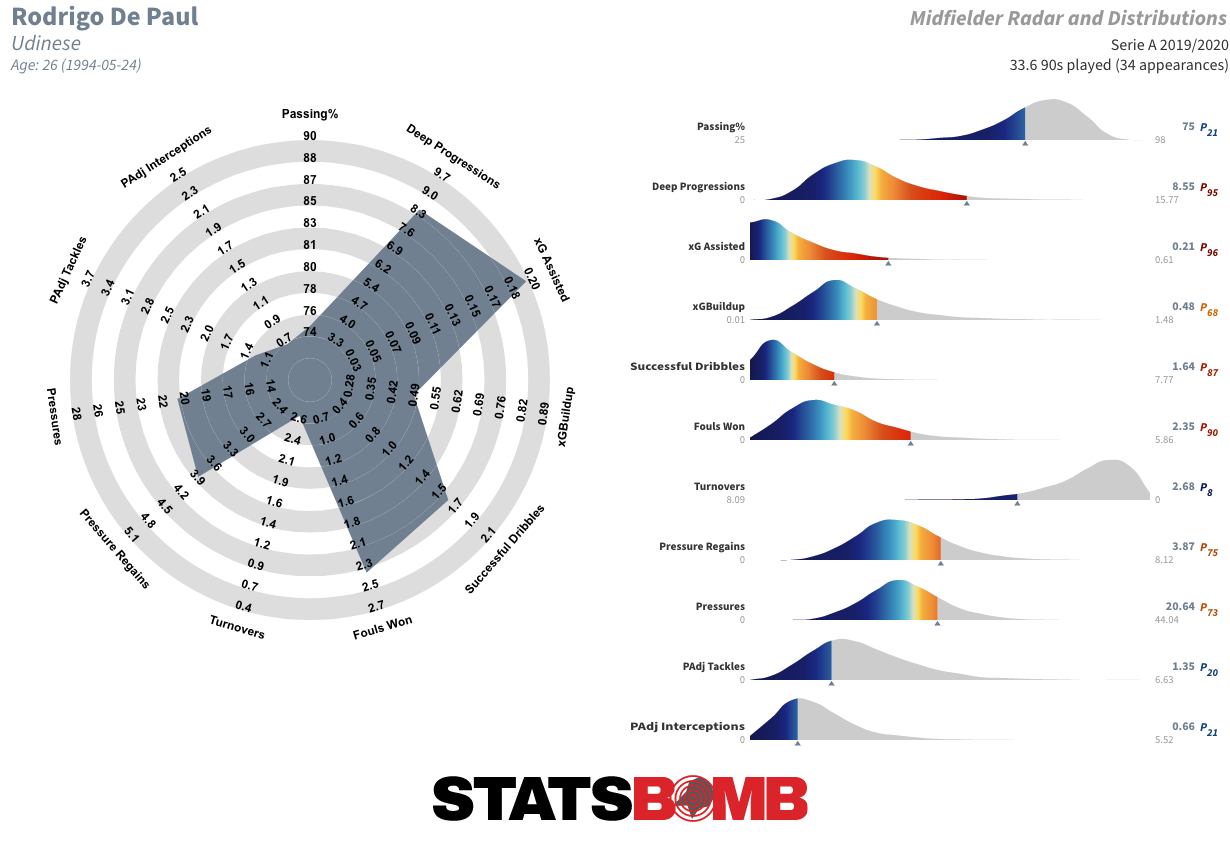 Maintaining a stable squad while upgrading in key positions seems a sensible way of confronting the club’s first Premier League season in 16 years, even though there is still a degree of uncertainty in terms of the performance levels that can be expected from some of the existing squad members. Many of these players were, after all, involved in a mid-table Championship finish in the season before Bielsa’s arrival. Any individual deficiencies will be that much clearer in the top flight. With that said, the front-foot style of play of the collective should be sufficient to get Leeds enough points from some of the league’s blander teams to provide a solid platform for a mid-table finish. Theirs is an exciting approach and it will be intriguing to see how they fare in their attempts to go toe-to-toe with teams towards the top of the table. An opening day trip to Anfield and champions Liverpool will give us an early taste of what to expect.
Maintaining a stable squad while upgrading in key positions seems a sensible way of confronting the club’s first Premier League season in 16 years, even though there is still a degree of uncertainty in terms of the performance levels that can be expected from some of the existing squad members. Many of these players were, after all, involved in a mid-table Championship finish in the season before Bielsa’s arrival. Any individual deficiencies will be that much clearer in the top flight. With that said, the front-foot style of play of the collective should be sufficient to get Leeds enough points from some of the league’s blander teams to provide a solid platform for a mid-table finish. Theirs is an exciting approach and it will be intriguing to see how they fare in their attempts to go toe-to-toe with teams towards the top of the table. An opening day trip to Anfield and champions Liverpool will give us an early taste of what to expect.
If you're a club, media or gambling entity and want to know more about what StatsBomb can do for you, please contact us at Sales@StatsBomb.com We also provide education in this area, so if this taste of football analytics sparked interest, check out our Introduction to Football Analytics course Follow us on twitter in English and Spanish and also on LinkedIn
